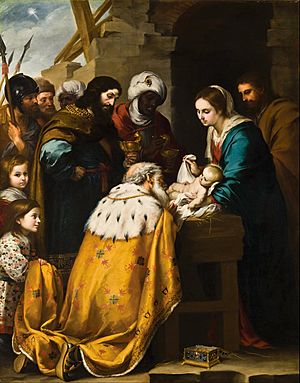We Three Kings facts for kids
Quick facts for kids Three Kings of Orient |
|
|---|---|

The Adoration of the Magi by Bartolomé Esteban Murillo
|
|
| Genre | Christmas carol |
| Written | 1857 |
| Text | John Henry Hopkins Jr. |
| Based on | Matthew 2:1 |
| Meter | 8.8.4.4.6 with refrain |
| Melody | "Three Kings of Orient" by John Henry Hopkins Jr. |
| Published | 1863 |
"We Three Kings", also known as "Three Kings of Orient", is a popular Christmas carol. John Henry Hopkins Jr. wrote this song in 1857. At that time, he was a rector (a type of church leader) at Christ Episcopal Church in Williamsport, Pennsylvania. He created the carol for a Christmas pageant in New York City. It was the first Christmas carol from America to become widely famous.
Contents
The Song's Words
Here are the words to "We Three Kings" as they were first printed in 1863:
THREE KINGS OF ORIENT.
1. We Three Kings of Orient are,
Bearing gifts we traverse afar,
Field and fountain,
Moor and mountain,
Following yonder Star.
CHORUS.
O Star of Wonder, Star of Night,
Star with Royal Beauty bright,
Westward leading,
Still proceeding,
Guide us to Thy perfect Light.
Gaspard.
2. Born a King on Bethlehem plain,
Gold I bring to crown Him again,
King for ever,
Ceasing never
Over us all to reign.
O Star, &c.
Melchior.
3. Frankincense to offer have I,
Incense owns a Deity nigh:
Prayer and praising
All men raising,
Worship Him God on High.
O Star, &c.
Balthazar.
4. Myrrh is mine; its bitter perfume
Breathes a life of gathering gloom;—
Sorrowing, sighing,
Bleeding, dying,
Sealed in the stone-cold tomb.
O Star, &c.
5. Glorious now behold Him arise,
King, and God, and Sacrifice;
Heav’n sings Hallelujah:
Hallelujah the earth replies.
O Star, &c.
How the Song Was Made
John Henry Hopkins Jr. designed "We Three Kings" so that three male voices would each sing a solo part. This was to represent the three kings. The first and last verses are sung by all three together. These are "verses of praise." The verses in between are sung by each king alone. Each king describes the special gift he is bringing. The chorus then praises the beauty of the Star of Bethlehem. Today, the kings' solo parts are often not sung in performances.
The song's tune has been called "sad" and "shifting." It sounds a lot like music from the Middle Ages and Middle Eastern music. People often compare it to these older styles.
The Story Behind the Song
The carol is about the Biblical Magi. These wise men visited Jesus as a child in a house. They gave him gifts of gold, frankincense, and myrrh. This event is told in the Gospel of Matthew in the Bible. However, the Bible does not say how many Magi there were. It also doesn't give their names or say if they were kings.
Later traditions gave them names: Melchior, Caspar, and Balthazar. They were also thought to be kings from the Orient (the East). The idea that there were three kings comes from the fact that three different gifts were given.
History and Impact
When John Henry Hopkins Jr. wrote "We Three Kings" in 1857, he was a church leader. He worked at Christ Episcopal Church in Williamsport, Pennsylvania. Before this, he was a journalist and studied to be a lawyer. But he decided to join the church instead. He studied at the General Theological Seminary in New York City. After finishing his studies, he became the first music teacher there in 1855.
Hopkins wrote "We Three Kings" for a Christmas pageant at the seminary. It was special because Hopkins wrote both the words and the music. Most carol writers at that time only wrote one or the other. The song was first called "Three Kings of Orient." His family and friends loved it. Because it was so popular, Hopkins decided to publish it in 1863. He put it in his book called Carols, Hymns, and Songs.
"We Three Kings" was the first Christmas carol from the United States to become widely known. It was also one of the first American carols to be in Christmas Carols Old and New. This was a very important collection of carols published in the United Kingdom. In 1916, the song was printed in the hymnal (songbook) for the Episcopal Church. That year's book was the first to have a special section just for Christmas songs. The Oxford Book of Carols, published in 1928, also included "We Three Kings." It praised the song as "one of the most successful of modern composed carols."
In Popular Music
Many different musicians have recorded "We Three Kings." This includes jazz, rock, and reggae artists.
- Percy Faith (1958)
- Ramsey Lewis (1964)
- The Beach Boys (1964)
- Kenny G (1999)
- Wynton Marsalis (1991)
- Rob Halford
- Blondie (2009)
Fun Parodies
Since the 1950s, kids have often made funny versions of this carol. The words in these parodies change a lot. They might talk about smoking rubber cigars or going to an Irish pub by taxi, car, and scooter.
See also
 In Spanish: We Three Kings para niños
In Spanish: We Three Kings para niños
 | Roy Wilkins |
 | John Lewis |
 | Linda Carol Brown |

